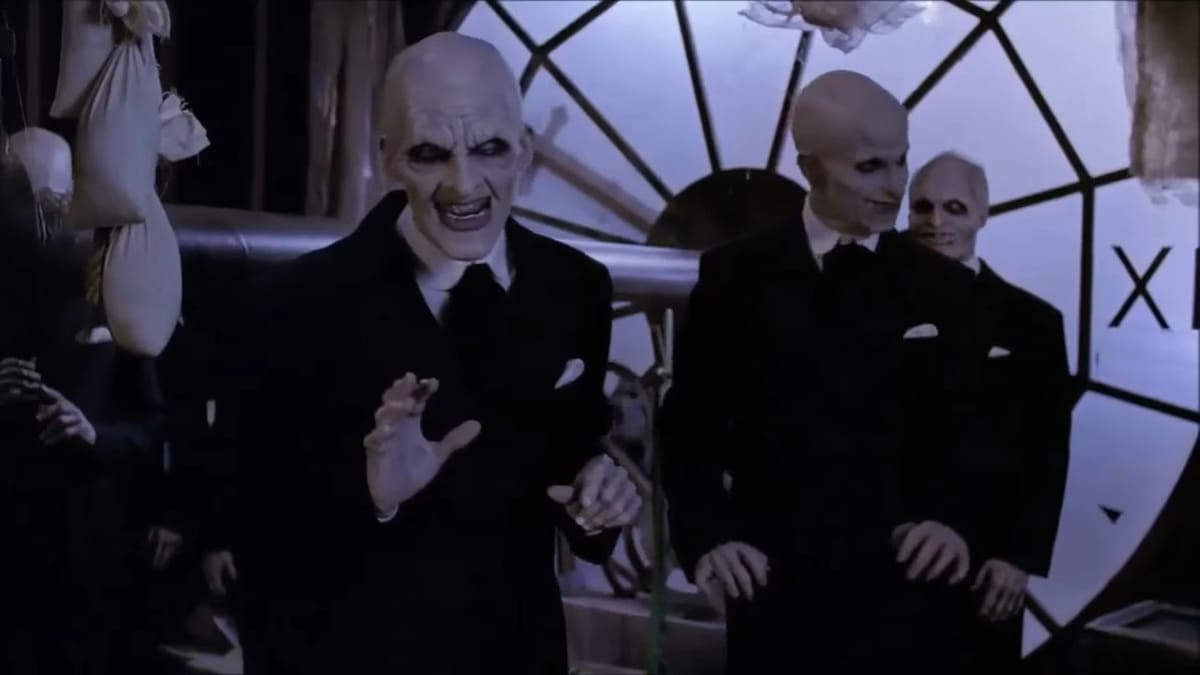When the episodes are better than the season
And vice versa.

I'm still very much in recovery mode, so this post will be slightly shorter than usual. Still, I hope you find the topic of interest! It's one of my favorites!
Recently, the second season of Severance ended, and the handful of general reactions I watched trickle in from my hospital bed vacillated wildly between "What an astonishing season of television!" and "That was it??!"
(Note: I have yet to finish Severance season two as I write this, so none of this should be taken as Emily St. James's Official Take on Severance Season Two. If you want that, you should probably become a paid subscriber. I'm going to write about it some Friday in the near future!)
In the midst of this skeet seesaw, I saw a post that got me excited, both because it was a possible explanation for the disparity – which, again, I cannot comment directly on because I haven't seen it – and because it got me thinking about one of my favorite topics in all of TV: when the quality of the episodes and the quality of the overall season arc don't quite gel in interesting ways.
i feel like every individual episode of season 2 of severance was among the best episodes of television i have ever seen and that season 2 of severance was an 8/10 season of television, if that makes sense
— rev. howard arson (@theophite.bsky.social) 2025-03-21T07:09:32.351Z
Serialized storytelling on TV requires simultaneously tracking micro and macro beats across episodes and the season. When all of these elements come together in a way that hits, there's really nothing like it. And when they all end up flying off in opposite directions, there's really nothing like that either.
Yet, needless to say, this level of attention to detail is hard for even the best of showrunners to keep track of. When I was younger and dumber, I once said every show's peak can only last two seasons max. Even if a show remains better than most TV, it can only best itself for so long. Now that I'm older and still not very bright, I would say that what I was talking about is just how hard it is for even, like, David Chase to make sure that the a to z of every single episode is also contributing to the A to Z of the whole season. There's going to be a little fudging around the edges here and there. The best shows distract you from this a little bit, but even they can only keep up that trick so long.
Most modern serialized shows when asked to focus either on the episodes or the arc will generally focus on the arc and let a few of the episodes slide. If you're going to have a couple of B-grade episodes on the way to an A-grade arc, that's almost always an acceptable tradeoff in my mind. What's more, modern TV viewers will generally forgive that sort of compromise, especially if the less exciting episodes occur earlier in the season or somewhere in the immediate vicinity of the finale. But gosh, you better nail that finale!
And yet! The season where all of the individual episodes are good-to-great, but the overall arc is a bit of a mess is an incredibly fascinating creature to me. It's far rarer, but it does exist. To point to an example of both types of season, let's look at one of my favorite TV shows ever: Buffy the Vampire Slayer.
(Note: We're talking about seasons of TV with 22 episodes, and in that sort of situation, there will always be a handful of outright stinkers just because of how that level of TV production works. In the following, assume that I'm mentally removing each season's five worst episodes.)
Buffy season six is an almost immediately recognizable example of the "the average grade of all of the episodes is probably B+, but the season arc itself is an A" phenomenon. There are a lot of episodes in that season that seem like the show putting the characters through it for specious reasons, and the central villains – the Nerd Trio – feel like a big step down from previous Big Bads. What's more, the season makes a couple of big narrative decisions that remain controversial to this day, including one major death that is still a significant source of Discourse.
Yet by the time you get to the last frames of the season and the show is underlining the themes the season talked about, it's easy to forgive a lot of the meandering. The overall thrust of the story – adulthood sucks, living is hard, and you have to lean on the people you love – is executed so perfectly that the failure of individual episodes to live up to what the arc is asking of them is easier to forgive.
Yet perhaps even more fascinating is the show's fourth season, where the series' writing staff and cast are working at a top-notch level, turning what could have easily been relatively humdrum episodes into masterpieces of comedic goofiness. (Yes, this season has "Beer Bad." Did you read about how I'm mentally removing the worst episodes?) Season four's individual episodes are often crackling fun, especially once the season gets out of an early run of slightly blah "what if college was hell too??" episodes. The season features what might be the series's very best episode, and it concludes with a standalone finale that takes enormous swings that mostly pay off. On an episode-to-episode level, the show was as strong as it ever was, arguably stronger than it was in season five, which is one of the two best Buffy seasons overall.
On an arc level, however, season four is an absolute mess. Its attempt to tell a sci-fi-inflected tale of horror doesn't ever really gel, the idea of a group of para-military monster hunters is always more interesting than truly compelling, and the show loses what could have been a cool Big Bad midway through the season in favor of a dull Frankenstein's monster riff. Yes, people remember many of the episodes from this season as fondly as they remember any episodes in TV history, but there's a reason the actual finale is more of an epilogue than a conclusion. The show's season arc sort of petered out an episode earlier.
Or consider the heady wonders of Lost, season three (in which the episodes are all over the place, but the arc builds to as sublime a climax as the show ever managed) vs. season four (in which the arc runs in place, but all of the episodes in that arc are perfectly executed – like "'The Constant' is there" levels of "perfectly executed").
So the question is which season you would rather watch as a TV viewer: a season where all the episodes are top-notch, but the arc doesn't quite gel; or a season where the arc culminates beautifully, but the path there is frequently riddled with potholes. As a viewer, I will generally prefer a strong overall season arc to something that doesn't quite add up in the end – but also, both Buffy and Lost would be immeasurably lesser shows without "Hush" and "The Constant" respectively. (If you're asking me what I would prefer as a TV writer, my answer is that I would absolutely love to perfectly nail a season-long arc, but I would also be so glad if my name were on a script as good as "Hush" or "The Constant," so... either or! I just like having a job.)
There's no right answer to this question. It's mostly about how you perceive TV's strengths and weaknesses as a medium. Nevertheless, I thought it would be an interesting thing to throw out to the group. So please let me know your answers to this question either by skeeting at me on Bluesky or (if you're a subscriber) by commenting here or in the Discord.
A Good Song
(Yes, season six has one of the other episodes people often call Buffy's best, namely "Hush's" spiritual sibling "Once More With Feeling," but I think you get my drift all the same.)
The free edition of Episodes, which (usually) covers classic TV and film, is published every other Wednesday, and the subscriber-supported edition of Episodes, which covers more recent stuff, is published every Friday. Paid subscribers also have access to the weekly Monday Rundown. This newsletter is written by Emily St. James and Libby Hill. If you have suggested topics, please reply to the email version of this newsletter or comment (if you are a paid subscriber).




